Three Prize Essays on American Slavery

Реклама. ООО «ЛитРес», ИНН: 7719571260.
Оглавление
Williston Timothy. Three Prize Essays on American Slavery
PREMIUM OFFERED
PREMIUM AWARDED
THE ERROR AND THE DUTY IN REGARD TO SLAVERY
FRIENDLY LETTERS TO A CHRISTIAN SLAVEHOLDER
LETTER I
LETTER II
LETTER III
LETTER IV
LETTER V
LETTER VI
LETTER VII
LETTER VIII
AN ESSAY, BY REV. TIMOTHY WILLISTON. IS AMERICAN SLAVERY AN INSTITUTION WHICH CHRISTIANITY SANCTIONS, AND WILL PERPETUATE? AND, IN VIEW OF THIS SUBJECT, WHAT OUGHT AMERICAN CHRISTIANS TO DO, AND REFRAIN FROM DOING?
ESSAY
Отрывок из книги
The undersigned, appointed a Committee to award a premium of one hundred dollars, offered by a benevolent individual, for the best Essay on the subject of Slavery, "adapted to receive the approbation of Evangelical Christians generally," have had under examination more than forty competing manuscripts, a large number of them written with much ability. They have decided to award the prize to the author of the Essay entitled, "The Error and the Duty in regard to Slavery," whom they find, on opening the accompanying envelope, to be the Rev. R. B. Thurston, of Chicopee Falls, Mass.
They would also commend to the attention of the public, two of the remaining tracts, selected by the individual who offered the prize, and for which he and others interested have given a prize of one hundred dollars each. One of these is entitled, "Friendly Letters to a Christian Slave-holder," by Rev. A. C. Baldwin, of Durham, Conn.; the other, "Is American Slavery an Institution which Christianity sanctions and will perpetuate?" by Rev. Timothy Williston, of Strongsville, Ohio.
.....
We cannot forbear to adduce an instance of unexceptionable testimony to the validity of this reasoning. In one or two famous articles on slavery and abolitionism, the Princeton Repertory adopts it, with another application, and says, "So far as polygamy and divorce were permitted under the old dispensation they were lawful, and became so by that permission; and they ceased to be lawful when that permission was withdrawn, and a new law given. That Christ did give a new law is abundantly evident." In the same manner, 'so far as' slavery 'was permitted under the old dispensation it was lawful, and became so by that permission; and it ceased to be lawful when that permission was withdrawn, and a new law given.' It is true, however, only in a qualified sense, that Christ gave "a new law" concerning polygamy and divorce. His law restored the original institution of marriage, as in Eden; and this was "new" to the Jews, because there had been departure from it. In like manner the New Testament, if not the very words of Christ, now gives a new law concerning slavery in the same sense; that is, as will appear, in the sequel, the Christian precepts restore the original institution concerning property as well as concerning marriage. The laws which allowed polygamy and slavery, and therefore the right, passed away together.
Here we leave the Old Testament. No other passages need examination; for all consist with these positions. So far as that sacred volume gives light, the world are bound by the laws and have equal right to the full blessings of three divine institutions, whose foundations were laid in Paradise, and whose complete and glorious proportions will encompass the universal, millennial felicity.
.....